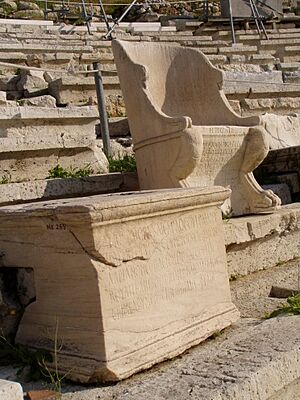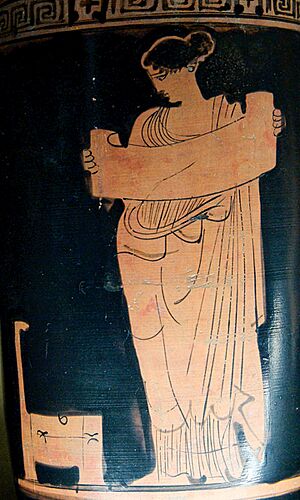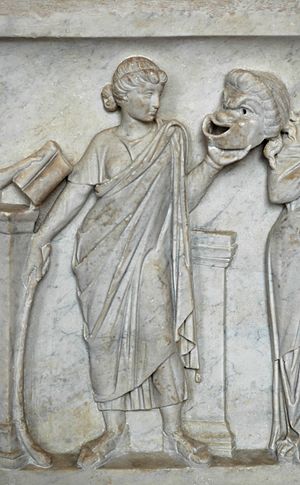Aristophanes facts for kids
Quick facts for kids
Aristophanes
|
|
|---|---|
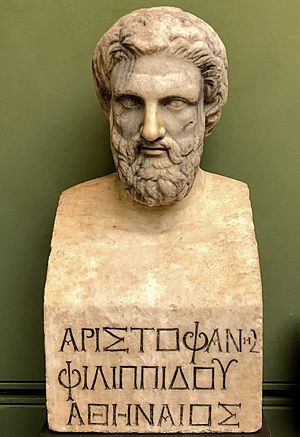
Bust of Aristophanes (1st century AD)
|
|
| Born | c. 446 BC Athens, Greece
|
| Died | c. 386 BC (aged c. 60) Delphi, Greece
|
| Occupation | Playwright (comedy) |
| Years active | 427 BC – 386 BC |
| Known for | Playwright and director of Old Comedy |
|
Notable work
|
|
| Notes | |
|
Although many artists' renderings of Aristophanes portray him with flowing curly hair, several jests in his plays indicate that he may have been prematurely bald.
|
|
Aristophanes (born around 446 BC, died around 386 BC) was a famous writer of funny plays, called comedies, in ancient Athens. He is known as "The Father of Comedy" because his plays are some of the best examples of a type of comedy called Old Attic Comedy.
We still have eleven of his forty plays almost completely. These plays help us understand what life was like in ancient Athens better than almost any other writer's work. Aristophanes was very good at making fun of people and ideas. Even important people like Plato noticed his plays. Plato even said that Aristophanes' play The Clouds made fun of the philosopher Socrates so much that it helped lead to Socrates' trial and death.
Aristophanes' second play, The Babylonians (which is now lost), was criticized by a powerful leader named Cleon. Cleon said the play made fun of the Athenian government. Aristophanes didn't stop there; he continued to make fun of Cleon in his later plays, especially The Knights. He even directed many of his own plays, saying it was "the hardest job of all."
Contents
About Aristophanes' Life
We don't know a lot about Aristophanes' personal life. Most of what we know comes from his own plays. In Old Comedy, the chorus (a group of performers) would sometimes speak for the author. This part was called the parabasis, and it gives us some clues about him.
Scholars also make educated guesses about Aristophanes' life by studying his language and other old writings. For example, we know that Aristophanes had three sons: Araros, Philippus, and another son named either Nicostratus or Philetaerus. His sons also became comedy writers.
Aristophanes lived through many big changes in Athens, including the Peloponnesian War and changes in government. Even though his plays were very political, it seems he wasn't deeply involved in politics himself. He might have been part of the Council of Five Hundred for a year, but this was common for citizens in democratic Athens.
How Aristophanes Used Language
Aristophanes was very aware of how other writers used language. His plays often mention other poets and playwrights, including famous tragedians like Aeschylus, Sophocles, and Euripides. He was just as skilled as these great writers in using beautiful and clever language in his songs and poems.
To truly enjoy Aristophanes' plays, it helps to understand the different poetic styles he used. He was a master at using different rhythms and sounds in his writing.
One of the most important things about his language is his use of imagery. He used comparisons (similes) and metaphors to create vivid pictures in the audience's mind. For example, in The Knights, a character's ears are described like umbrellas that open and close. In The Frogs, he says that Aeschylus writes verses like a horse rolling in sand.
Aristophanes and Public Speaking
Aristophanes often criticized rhetoric, which was the art of public speaking and persuasion. He believed that the teachers of rhetoric, called sophists, were wrong because they charged money for their lessons. This meant that only rich students could learn from them, leaving out most people. Aristophanes thought that education should be available to everyone, not just the wealthy.
Aristophanes and Old Comedy Plays
Aristophanes' plays are key examples of Old Comedy. Understanding Old Comedy helps us understand his plays better. Old Comedy offered many different kinds of entertainment to a wide audience. It could be serious, lighthearted, or include beautiful songs. It also featured silly jokes, made-up words, and wild, absurd stories.
In Aristophanes' comedies, the main character is usually a clever and independent person. They are often like the smart hero Odysseus from ancient Greek stories. This hero usually comes up with a very imaginative plan to escape a difficult situation.
The plays followed a crazy logic, but they also had a clear structure. This structure was repeated in many of his plays, though the specific details changed.
Aristophanes' Impact and Legacy
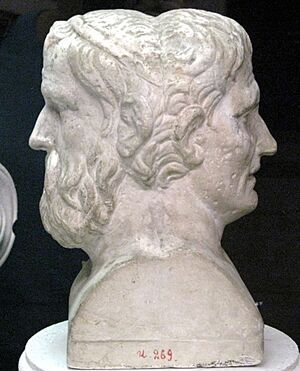
Aristophanes' plays were translated into Latin and spread across Europe during the Renaissance. Later, they were translated into modern languages and inspired many writers. For example, the French playwright Jean Racine based his play Les Plaideurs on Aristophanes' The Wasps. Even Johann Wolfgang von Goethe, a famous German writer, adapted The Birds for a play.
Beyond their artistic value, Aristophanes' plays are like historical documents. They give us a window into what life and politics were like in classical Athens. His plays have had a huge impact on the history of European theater. Many famous sayings also come from his works, like "By words the mind is winged."
Cool Facts About Aristophanes
- Aristophanes' name means 'one who appears best'.
- His plays were performed at big festivals in Athens, like the Lenaia and City Dionysia. Here, his plays competed against others for prizes.
- He often shared old-fashioned views and showed respect for older generations in his plays.
- Aristophanes didn't direct his first three plays himself.
- He won second prize at the City Dionysia in 427 BC with his first play, The Banqueters (now lost). He was probably only about 18 years old then!
- He won first prize with his next play, The Babylonians (also lost).
- Some jokes in his plays suggest that he might have been bald early in life.
- He won first prize at least once at the City Dionysia and at least three times at the Lenaia.
- His son, Araros, also became a comedy writer and helped produce his father's play Wealth II.
- The way Aristophanes used language was considered a perfect example of the Attic dialect (a form of ancient Greek).
- His plays were used to study public speaking and the Attic dialect in later centuries.
- It's possible that Plato sent copies of Aristophanes' plays to a ruler named Dionysius of Syracuse so he could learn about Athenian life.
Aristophanes' Plays
Plays We Still Have
- The Acharnians (425 BC)
- The Knights (424 BC)
- The Clouds (original 423 BC, a revised version from 419 to 416 BC still exists)
- The Wasps (422 BC)
- Peace (first version, 421 BC)
- The Birds (414 BC)
- Lysistrata (411 BC)
- Thesmophoriazusae or The Women Celebrating the Thesmophoria (around 411 BC)
- The Frogs (405 BC)
- Ecclesiazusae or The Assemblywomen (around 392 BC)
- Wealth (second version, 388 BC)
Lost Plays (We Know When They Were Written)
- Banqueters (427 BC)
- Babylonians (426 BC)
- Farmers (424 BC)
- Merchant Ships (423 BC)
- Clouds (first version, 423 BC)
- Proagon (422 BC)
- Amphiaraus (414 BC)
- Plutus (Wealth, first version, 408 BC)
- Gerytades (probably 407 BC)
- Cocalus (387 BC)
- Aiolosicon (second version, 386 BC)
Lost Plays (We Don't Know When They Were Written)
- Aiolosicon (first version)
- Anagyrus
- Frying-Pan Men
- Daedalus
- Danaids
- Centaur
- Heroes
- Lemnian Women
- Old Age
- Peace (second version)
- Phoenician Women
- Polyidus
- Seasons
- Storks
- Telmessians
- Triphales
- Thesmophoriazusae (Women at the Thesmophoria Festival, second version)
- Women in Tents
Plays Possibly by Others (Attributed to Aristophanes)
|
|
See Also
 In Spanish: Aristófanes para niños
In Spanish: Aristófanes para niños
- Hubert Parry wrote music for The Birds
- Theatre of ancient Greece
 | Laphonza Butler |
 | Daisy Bates |
 | Elizabeth Piper Ensley |


